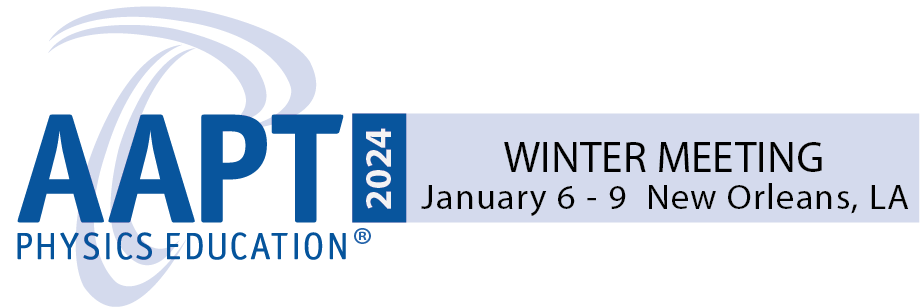2024 Winter Meeting
January 6–9, New Orleans, Louisiana
Statistics
- Attendees: 500
- Exhibitors: 7
- Sessions: 69
- Workshops: 7
- Commercial Workshops: 4
- Topical Discussion: 2
- Poster Sessions: 2
Program Committee Chair: Gabriel Spalding
The Annual Meeting Planning 2024 (AMP24) team : Toni Sauncy, Andy Gavrin, Doug Petkie, Susan Kelly, Rhett Allain
AAPT returned to beautiful downtown New Orleans. The Big Easy, well known for its cross-cultural and multilingual heritage, provided a lively and entertaining backdrop for physicists and physics educators as they met to share information and ideas spanning a wide variety of themes,
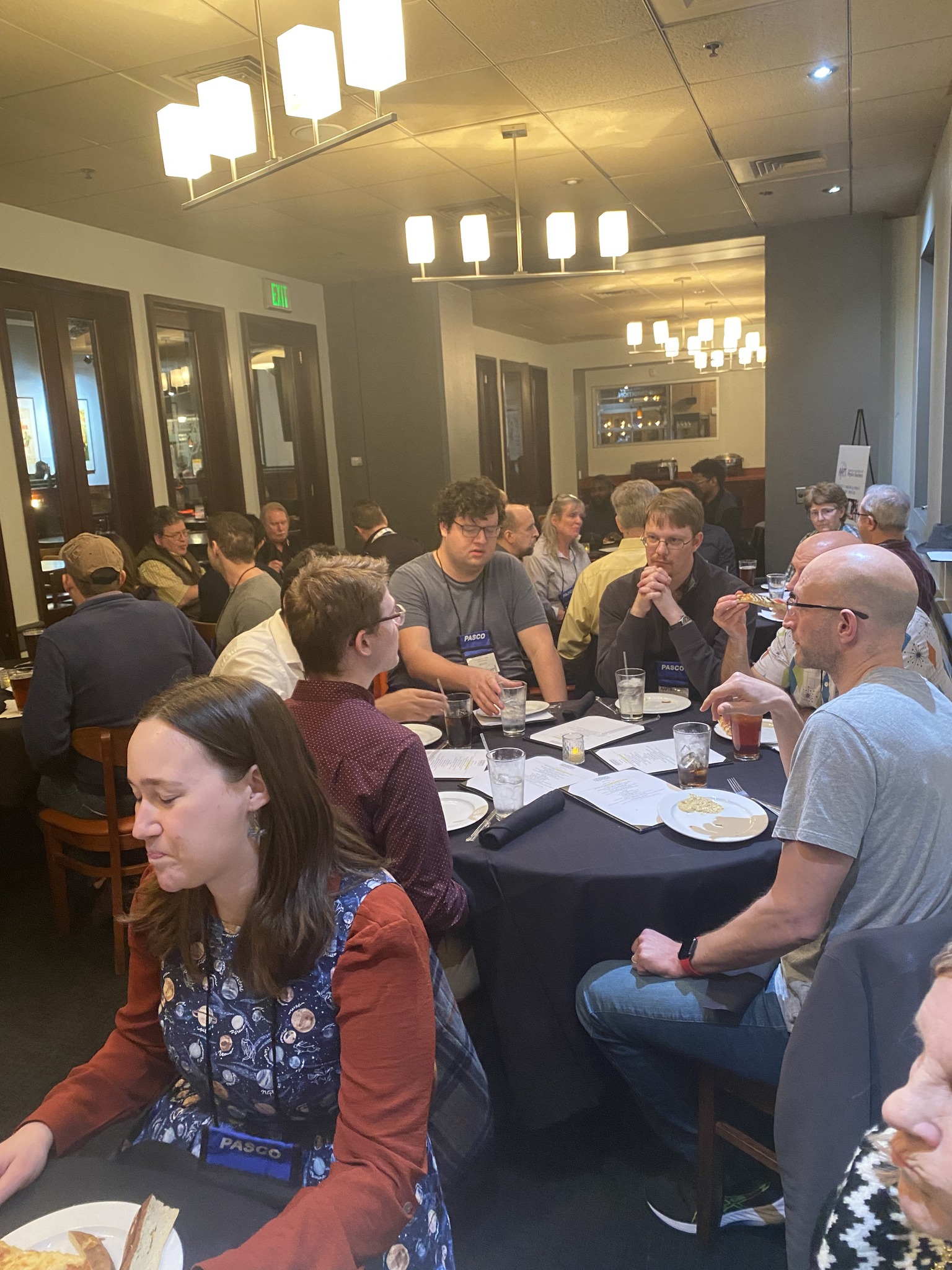
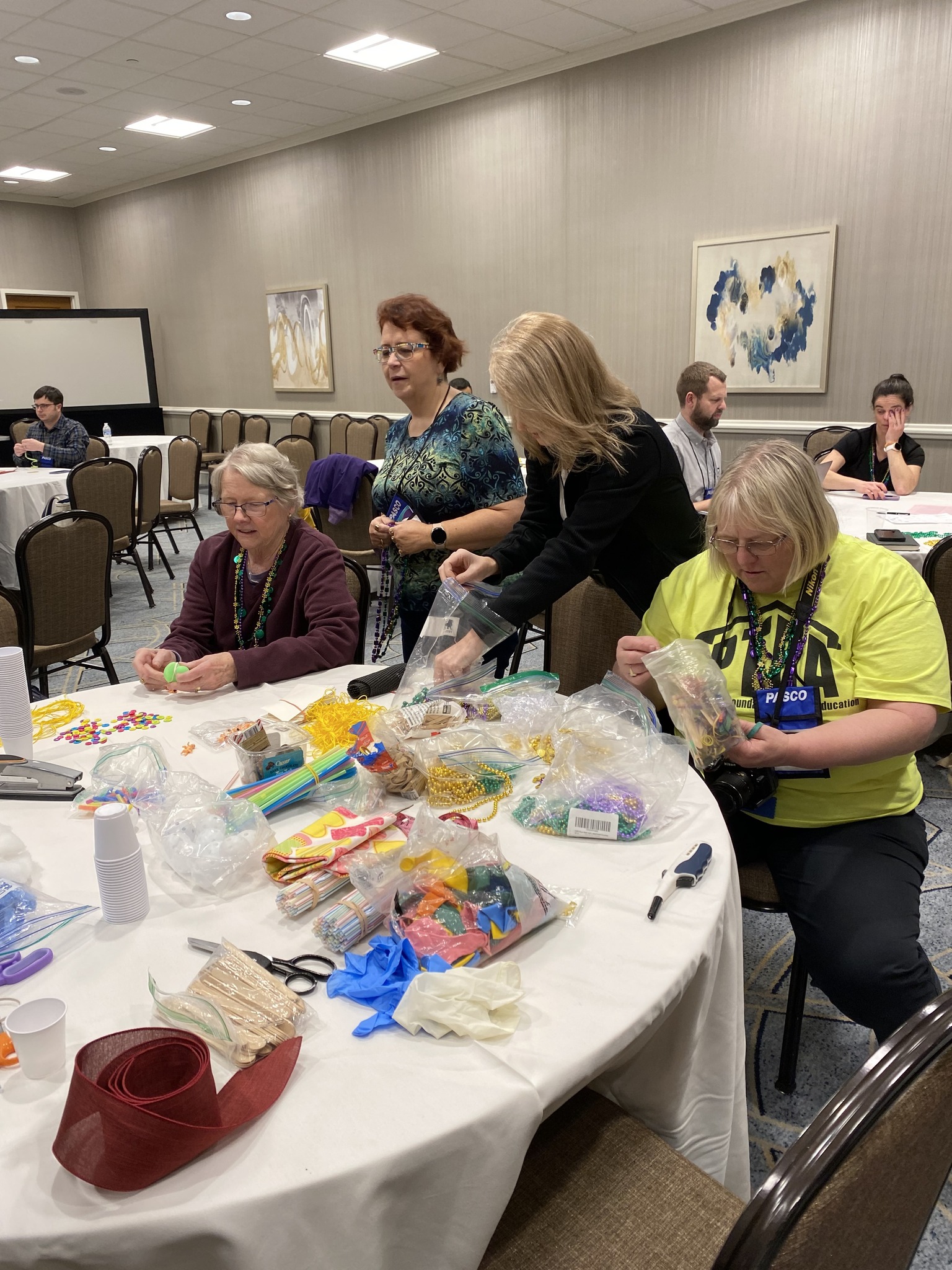
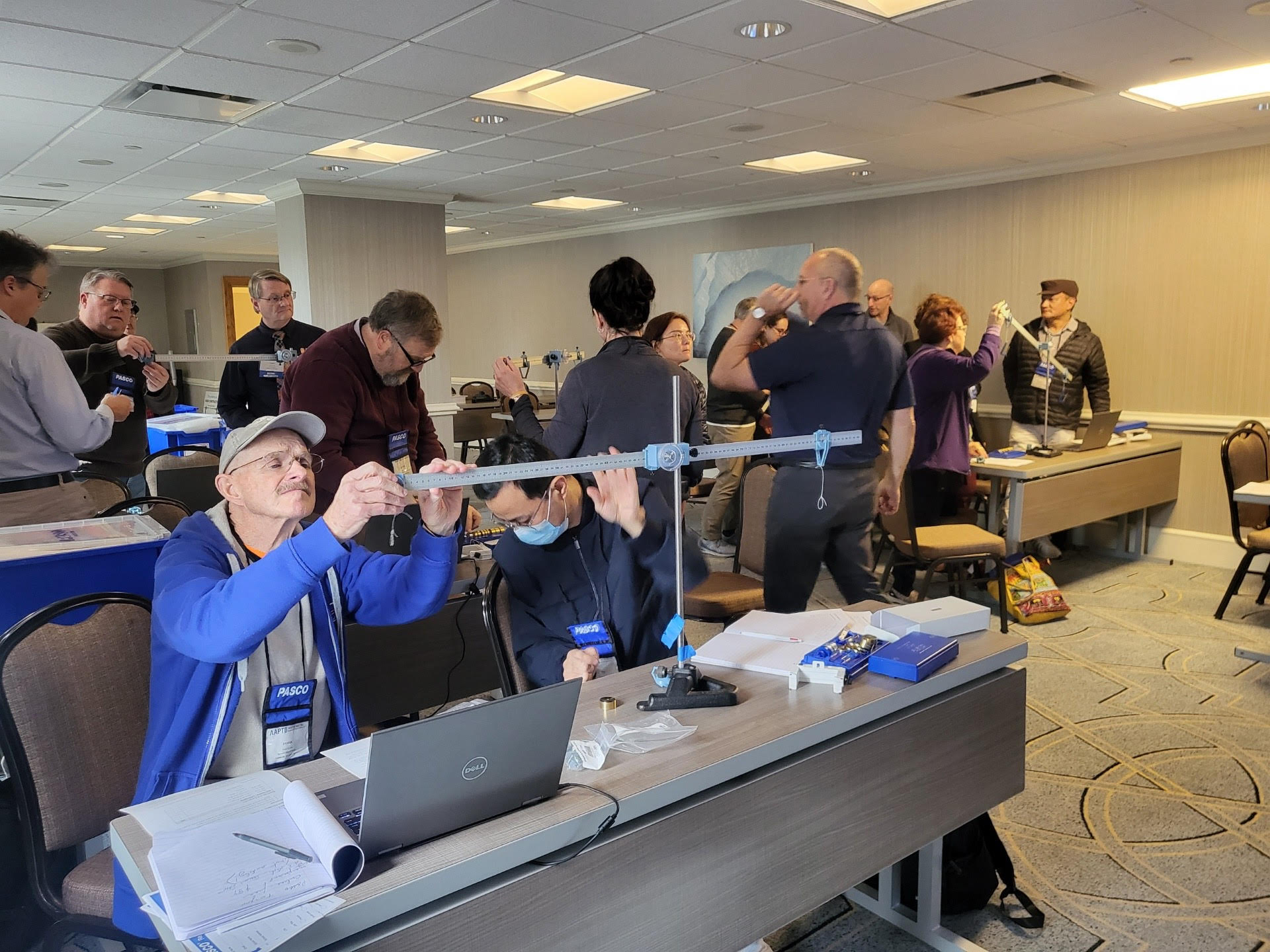
Attendees also enjoyed a variety of social opportunities such as the Accessibility and LGBTQ+, and K-12 Teacher Meet-Ups, Early Career Professional Speed Networking event, Early Career and First Timers Gathering, Two Year College Meet-Up, First Timers' Gathering, International Meet-Up, SPS Awards, and Game Night.
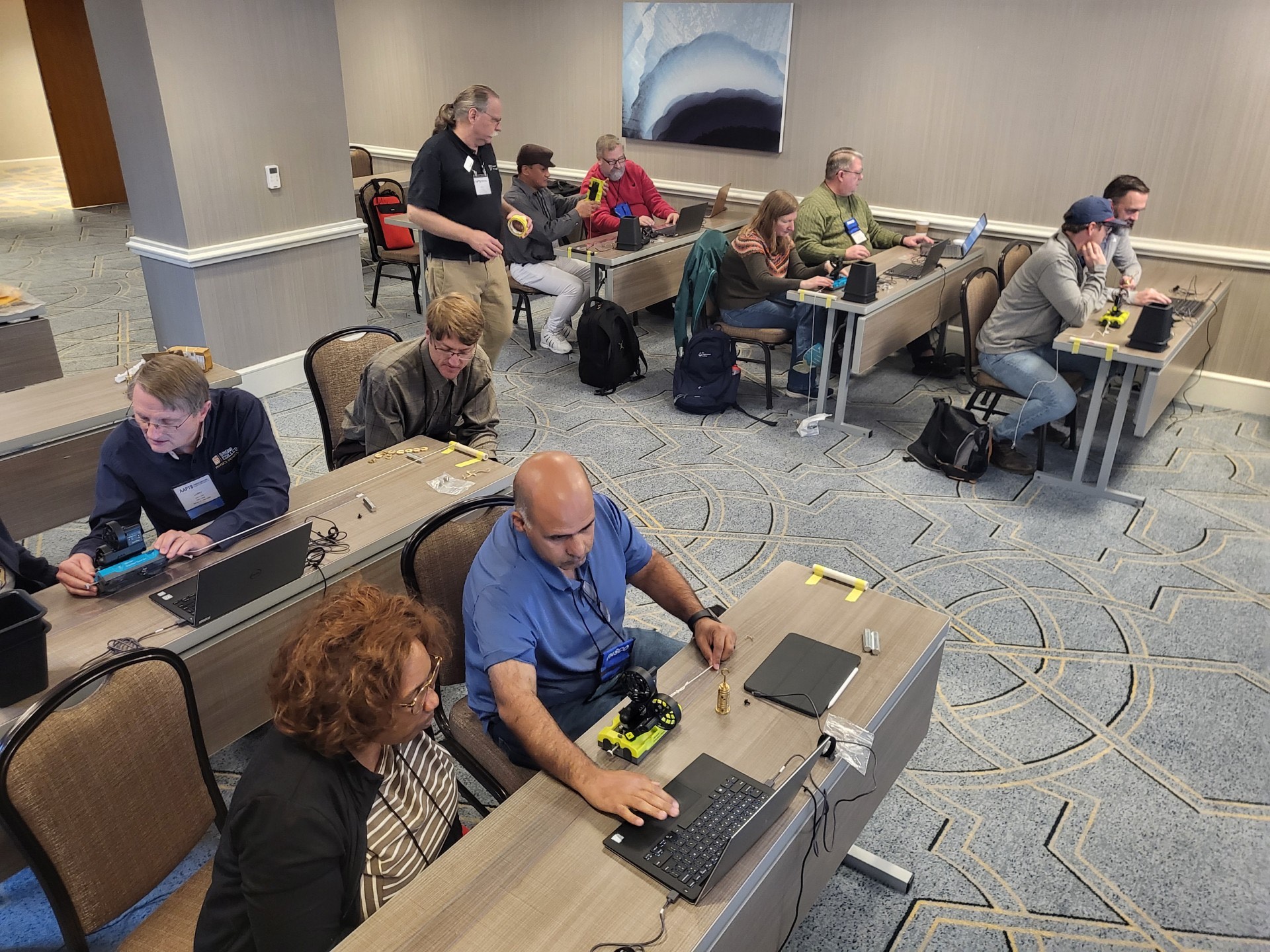
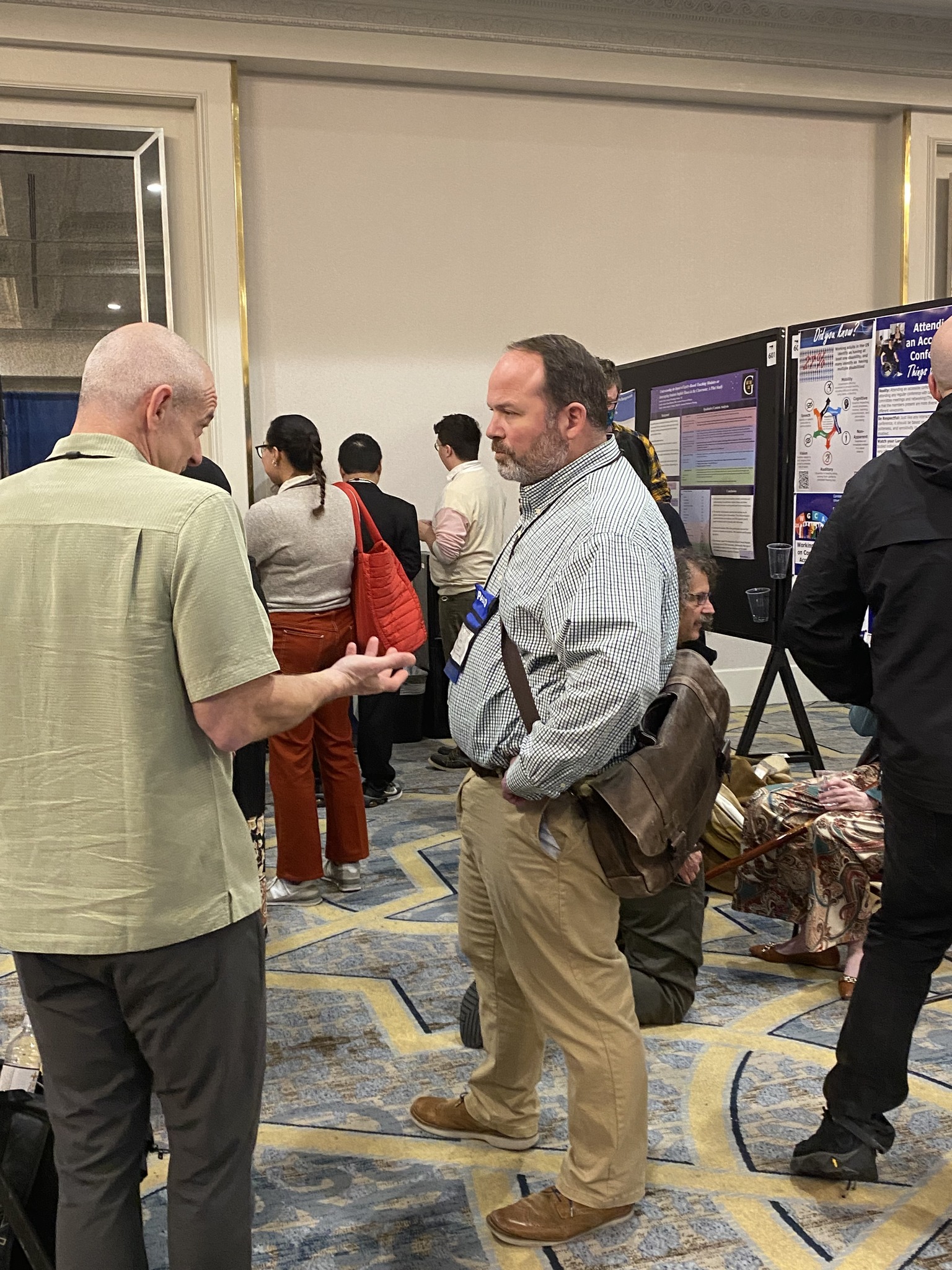
Meeting of the Members
The 2024 AAPT Meeting of Members gave attendees the opportunity to learn about the governance and activities of their association. Secretary Blaine Baker reported on the results of the 2023 AAPT National Election and the Nominating Committee for 2024. The Chair of the Section Representatives, Sam Sampere shared information regarding the activities of the sections and the AAPT Treasurer, Tom O’Kuma reported on the financial position of the association. Executive Officer, Beth Cunningham and President Duane Merrell presented information on the status of AAPT programs.
Time during the meeting was devoted to honor the memory of prominent AAPT members who died during 2023: Vasant Itagi, Thomas Rossing, Paul Hickman, Priscilla Laws, Charles H. Holbrow, and Harvey Leff.
Sessions, sponsored by AAPT Committees, comprised the bulk of the educational content for the program. Sessions addressed:
- Frontiers in Space Science
- Hybrid Physics Instruction
- Physics Labs Beyond the 1st Year
- Physics of Jazz
- Practical DEI for Teaching
- Quantum in High School
- Reading ‘Round Science
- 21st Century Astronomy and Physics Classroom
- Innovations in HS and Intro Labs
- Teaching and Learning
- AI in Physics
- Lab Activities and Learning-Advanced Lab
- Evidence of Climate Change
- Strategies to Support K-12 Physics Learning
- Critical Race Theory in Physics Education research
- Authentic Research Across the Spectrum
- Cosmic Ray Studies in the Classroom
- Innovations in K-12 Teacher Professional Learning
- Iron Chef Challenge: Mardi Gras Style
Plenaries
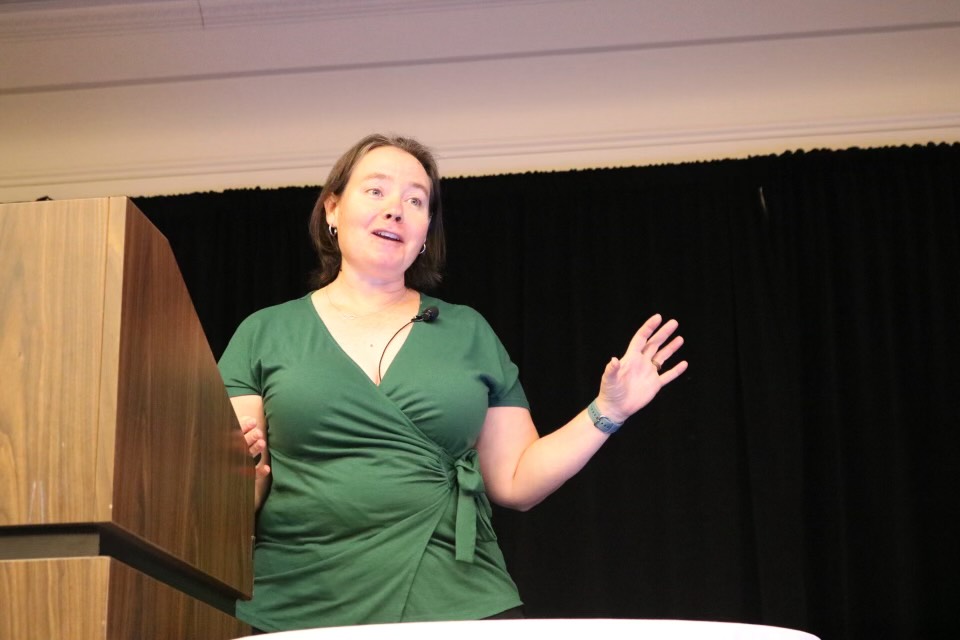 Sanlyn Buxner is a Senior Research Scientist and Senior Education and Communication Specialist at the Planetary Science Institute in Tucson, Arizona. She is also an Associate Research Professor in the Department of Teaching, Learning, and Sociocultural Studies at the University of Arizona where she serves as a director of graduate studies. She serves as the Public Engagement Lead for the SSERVI TREX node and the Director of Broader Impact for the NASA SHIELD DRIVE Science Center. She is an active science education researcher, her research areas include: investigating the impact of research experiences on K-12 teachers and students and undergraduate students; understanding and improving of undergraduate experiences and outcomes in general education and major-level STEM courses; supporting and diversifying graduate students in STEM; supporting K-12 students and teachers in out of school informal education spaces; and understanding the role of supporting community science on empowering communities. She is the co-chair of the AAS Education Committee, recent past Education Officer of the Division for Planetary Sciences, and serves on the Education Executive Committee of the American Geophysical Union. She has co-authored over 40 peer-reviewed journal publications as well as numerous conference papers and presentations, and book chapters, and co-authored and edited several books in astronomy education.
Sanlyn Buxner is a Senior Research Scientist and Senior Education and Communication Specialist at the Planetary Science Institute in Tucson, Arizona. She is also an Associate Research Professor in the Department of Teaching, Learning, and Sociocultural Studies at the University of Arizona where she serves as a director of graduate studies. She serves as the Public Engagement Lead for the SSERVI TREX node and the Director of Broader Impact for the NASA SHIELD DRIVE Science Center. She is an active science education researcher, her research areas include: investigating the impact of research experiences on K-12 teachers and students and undergraduate students; understanding and improving of undergraduate experiences and outcomes in general education and major-level STEM courses; supporting and diversifying graduate students in STEM; supporting K-12 students and teachers in out of school informal education spaces; and understanding the role of supporting community science on empowering communities. She is the co-chair of the AAS Education Committee, recent past Education Officer of the Division for Planetary Sciences, and serves on the Education Executive Committee of the American Geophysical Union. She has co-authored over 40 peer-reviewed journal publications as well as numerous conference papers and presentations, and book chapters, and co-authored and edited several books in astronomy education.
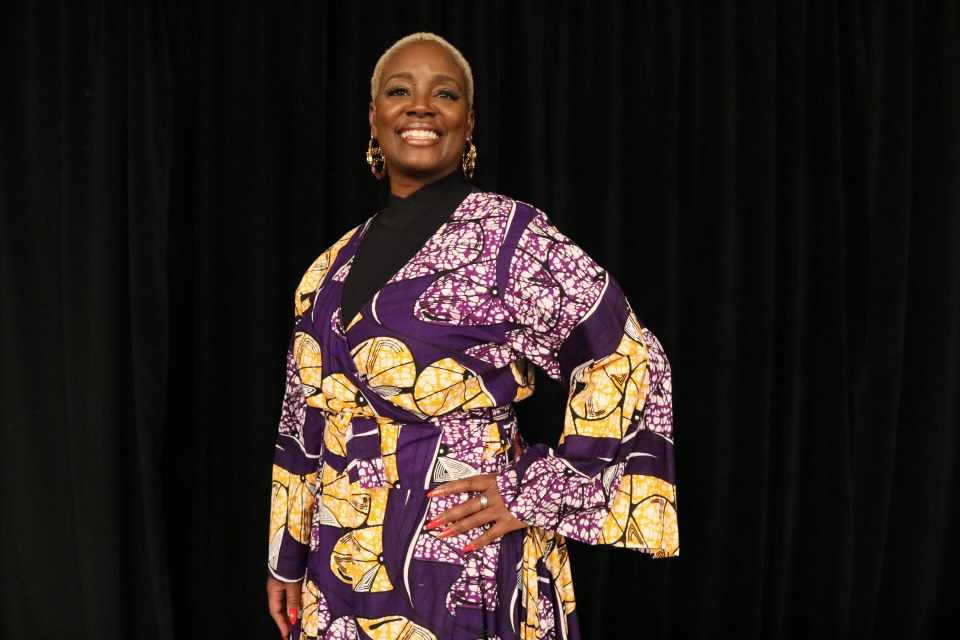 K. Renee Horton, hailing from Baton Rouge, Louisiana, possesses a lifelong passion for science and NASA. Graduating from Louisiana State University (LSU) in 2002 with a B.S. in Electrical Engineering and a minor in Math, she furthered her academic journey, earning a Ph.D. in Material Science with a concentration in Physics. Notably, she made history in 2011 as the first African American to graduate in this field from the University of Alabama.
K. Renee Horton, hailing from Baton Rouge, Louisiana, possesses a lifelong passion for science and NASA. Graduating from Louisiana State University (LSU) in 2002 with a B.S. in Electrical Engineering and a minor in Math, she furthered her academic journey, earning a Ph.D. in Material Science with a concentration in Physics. Notably, she made history in 2011 as the first African American to graduate in this field from the University of Alabama.
Currently, Horton holds the position of Electrified Powertrain Flight Demonstrator Project (EPFD) Airworthiness Deputy at NASA’s Michoud Assembly Facility in New Orleans. Her tenure with NASA began in 2009 as a student, later transitioning into the role of mechanical test engineer in 2012.
In 2016, she achieved another milestone by being elected President of the National Society of Black Physicists (NSBP), becoming only the second woman to hold this prestigious office. Beyond her national leadership, she contributes globally as a member of the International Union of Pure and Applied Physics (IUPAP) Women in Physics Working Group and serves on various advisory boards dedicated to fostering diversity in physics. Her outstanding contributions to the NSBP led to her elevation as a Fellow in 2017, the organization's highest honor.
Horton is a sought-after speaker, having graced platforms such as the United Nations for the first International Women and Girls Day, Essence Power Stage, March for Science – New Orleans, and LSU Engineering Spring Commencement. Her influence extends worldwide, with speaking engagements spanning South Africa, Brazil, South Korea, Canada, Mexico, and the picturesque Virgin Islands. Additionally, she shares her expertise through her authored works, including "Dr. H Explores the Universe," "Dr. H and her Friends," and "Dr. H Explores the ABCs."
Awards
Member service to AAPT was recognized with the announcement of the Homer L. Dodge Citations for Distinguished Service to AAPT awarded to Jennifer Blue, Anthony Mwene Musumba, Juan Burciaga, and Tatiana Erukhimova.
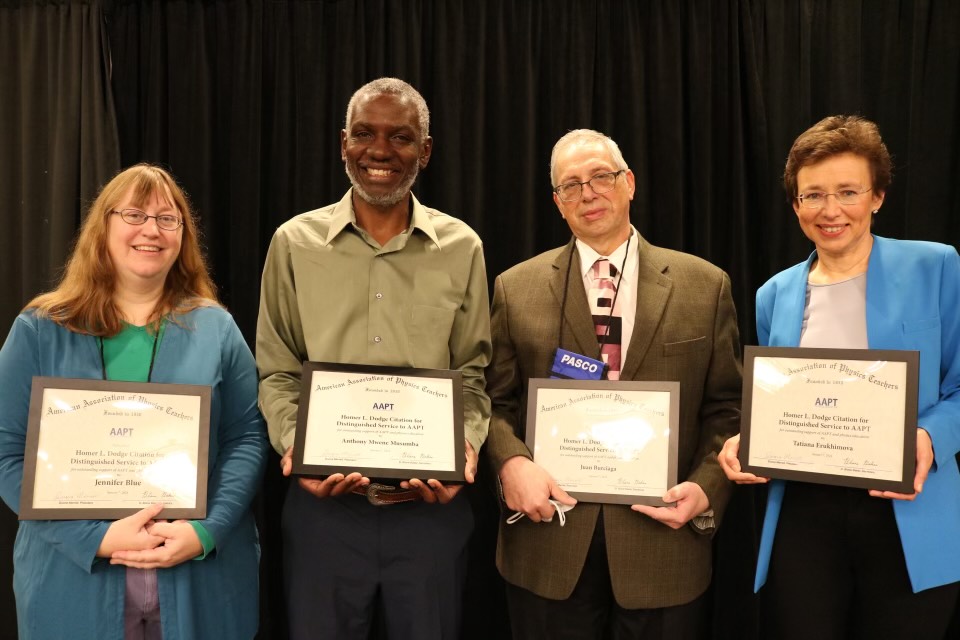
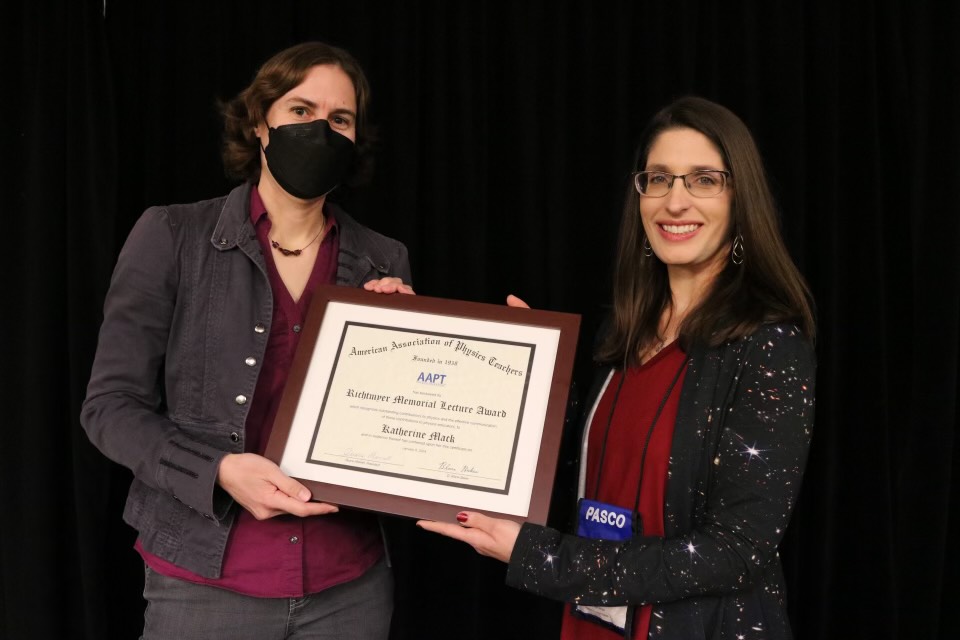 Katherine (Katie) Mack was recognized as 2024 recipient of the Richtmyer Memorial Lecture Award. She is recognized with the award for outstanding contributions to physics and for effectively communicating those contributions to physics educators. Her talk, Dark Matter: The Cosmic Mystery at the Heart of Particle Physics on Monday. Mack is a theoretical astrophysicist who studies a range of questions in cosmology, the study of the universe from beginning to end. She currently holds the position of the Hawking Chair in Cosmology and Science Communication at the Perimeter Institute. Throughout her career, she has placed an emphasis on sharing science with the broader public. A scientist whose research relies on public funding, she considers it part of her job to share her knowledge and expertise with people outside the world of science and academia. As part of her role, she frequently takes part in outreach activities (public lectures, school visits, mentoring events, videos, podcasts, etc) and makes herself available for interviews.
Katherine (Katie) Mack was recognized as 2024 recipient of the Richtmyer Memorial Lecture Award. She is recognized with the award for outstanding contributions to physics and for effectively communicating those contributions to physics educators. Her talk, Dark Matter: The Cosmic Mystery at the Heart of Particle Physics on Monday. Mack is a theoretical astrophysicist who studies a range of questions in cosmology, the study of the universe from beginning to end. She currently holds the position of the Hawking Chair in Cosmology and Science Communication at the Perimeter Institute. Throughout her career, she has placed an emphasis on sharing science with the broader public. A scientist whose research relies on public funding, she considers it part of her job to share her knowledge and expertise with people outside the world of science and academia. As part of her role, she frequently takes part in outreach activities (public lectures, school visits, mentoring events, videos, podcasts, etc) and makes herself available for interviews.
As @AstroKatie, she has amassed a Twitter following of more than 400,000. Her popular writing (https:// www.astrokatie.com) has appeared in major publications including Scientific American, Slate, Sky & Telescope, Cosmos, BBC Science Focus, The New York Times, and The Wall Street Journal. In 2020, she released her first book “The End of Everything (Astrophysically Speaking)” which examines five ways the universe could end and the mind-blowing lessons each scenario reveals about the most important concepts in cosmology. It was named a New York Times Notable Book of 2020 and continues a storied tradition of science communication of which Hawking himself is perhaps the most known example.
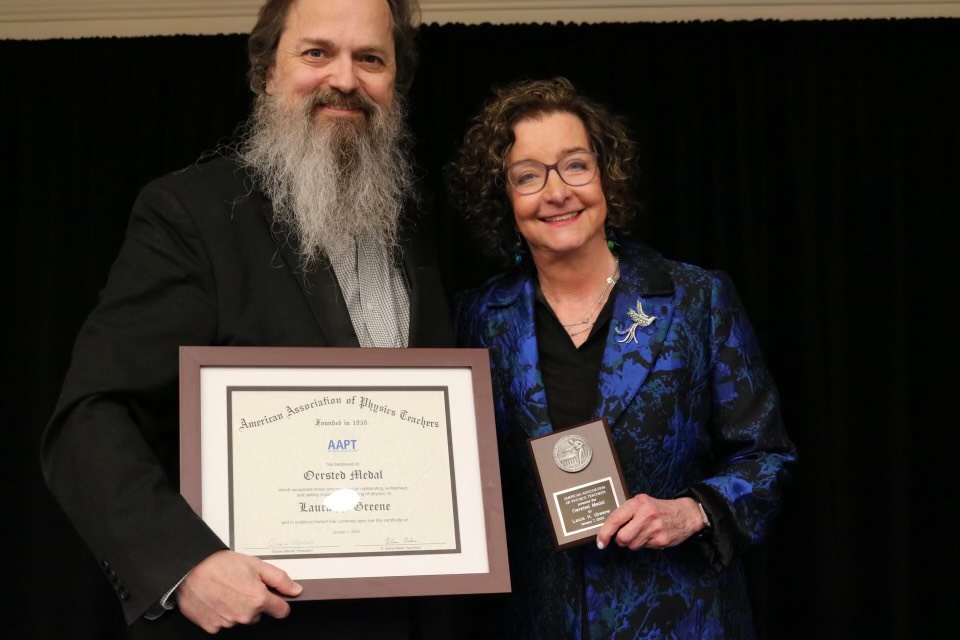 Laura H. Greene was the 2024 recipient of the prestigious Hans Christian Oersted Medal. The Oersted Medal recognizes her outstanding, widespread, and lasting impact on the teaching of physics through his national leadership in physics education. Greene is Chief Scientist at the National High Magnetic Field Laboratory and the Marie Krafft Professor of Physics at Florida State University. She was previously the Swanlund and the Center for Advanced Study Professor of Physics at the University of Illinois at Urbana-Champaign. Her undergraduate studies were at The Ohio State University, and after receiving her PhD at Cornell University, she was a post doc at Bell Labs then a member of staff at Bellcore.
Laura H. Greene was the 2024 recipient of the prestigious Hans Christian Oersted Medal. The Oersted Medal recognizes her outstanding, widespread, and lasting impact on the teaching of physics through his national leadership in physics education. Greene is Chief Scientist at the National High Magnetic Field Laboratory and the Marie Krafft Professor of Physics at Florida State University. She was previously the Swanlund and the Center for Advanced Study Professor of Physics at the University of Illinois at Urbana-Champaign. Her undergraduate studies were at The Ohio State University, and after receiving her PhD at Cornell University, she was a post doc at Bell Labs then a member of staff at Bellcore.
In September 2021 Greene was appointed by President Joseph R. Biden to serve as a member of the President’s Council of Advisors for Science and Technology (PCAST), which directly advises him on matters of science and technology including STEM education.
As a leading advocate for diversity in science, a champion for women in science and engineering, science diplomacy, ethics, and human rights, she has held leadership roles in many science organizations nationally and internationally, including the 2017 president of the American Physical Society (APS), the Board of Directors for the American Association for the Advancement of Science (AAAS), and is the Vice President for Ethics and Outreach of the International Union of Pure and Applied Physics (IUPAP). She has been a member of the State Department-supported COACh team, and continues to promote the success and impact of women and minority scientists, particularly in developing countries, through their workshops which include negotiation, leadership, networking, publishing, and communication skills.
Greene’s own research is on quantum materials, focusing on the fundamental studies of novel materials and their synthesis, and the mechanisms of unconventional superconductivity. She has co-authored over 200 publications and has presented over 700 invited talks. The scientific community has recognized Greene’s scientific excellence with many awards and honors. She is a member of the National Academy of Sciences and the American Academy of Arts and Sciences and is a fellow of the Institute of Physics (U.K.), the AAAS, and the APS. She received the Tallahassee Scientific Society Gold Medal Award, and the American Physical Society Five Sigma Physicist Award for Advocacy in Science Policy has been a Guggenheim Fellow, was awarded the E.O. Lawrence Award for Materials Research from the U.S. Department of Energy, the APS Maria Goeppert- Mayer Award, and the Bellcore Award of Excellence.
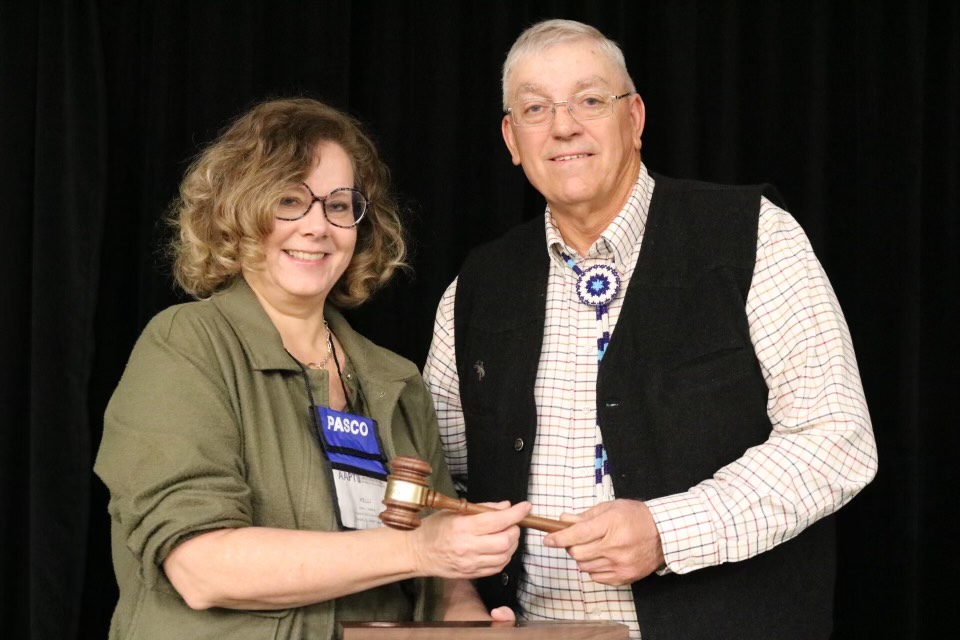 The meeting concluded with the Presidential Transfer where Duane Merrell turned the Presidential Gavel over to incoming president, Kelli Warble.
The meeting concluded with the Presidential Transfer where Duane Merrell turned the Presidential Gavel over to incoming president, Kelli Warble.


